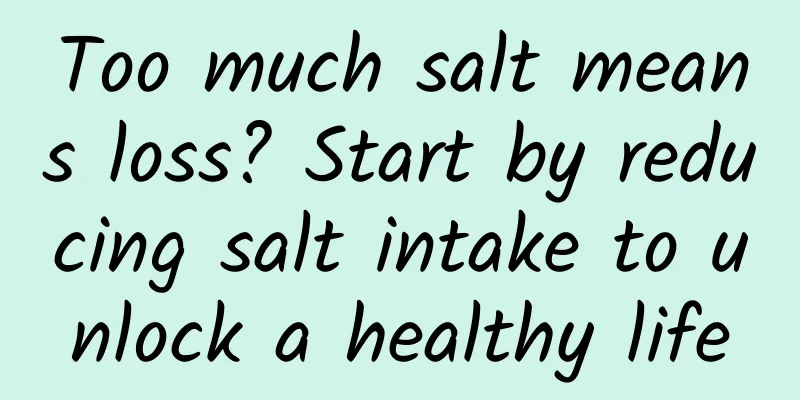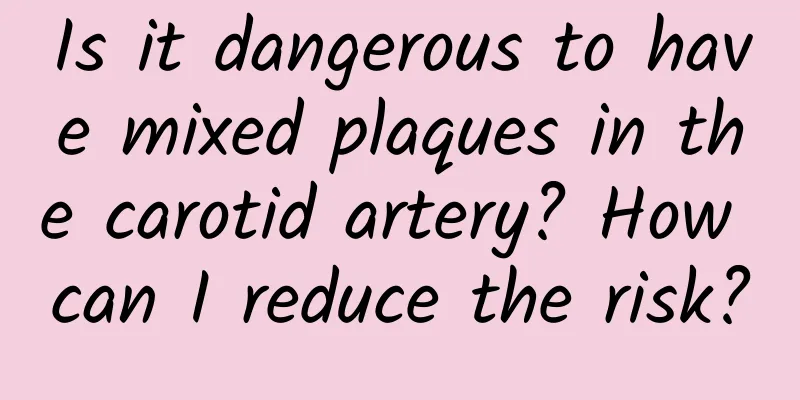Too much salt means loss? Start by reducing salt intake to unlock a healthy life

|
Author: Wang Jingzhi The First Affiliated Hospital of Harbin Medical University Zhang Yiwen The First Affiliated Hospital of Harbin Medical University Reviewer: Zhi Jixin, Chief Physician, The Fourth Affiliated Hospital of Harbin Medical University In daily life, salt is one of the most common condiments. Many people like heavy-tasting food, especially salty dishes. However, excessive intake of salt can bring many adverse effects to our body. A high-salt diet is one of the important causes of high blood pressure, and high blood pressure is the "black hand" behind many serious diseases. Start the salt reduction campaign and unlock a healthy life. High-salt diet is harmful 1. Increased blood pressure Salt contains a lot of sodium. When we consume too much salt, sodium will accumulate in the body and increase the osmotic pressure of the blood. In this way, the body needs to retain more water to dilute the excess sodium, resulting in an increase in blood volume and increased blood pressure. Figure 1 Copyright image, no permission to reprint 2. Increase the burden on the heart and kidneys High blood pressure increases the workload of the heart and kidneys, making them more susceptible to damage. Long-term high-salt diet may also lead to a series of problems such as myocardial hypertrophy, heart failure, and arteriosclerosis. 3. Increase the risk of stroke A high-salt diet can damage blood vessels and increase the risk of stroke. Many patients with cardiovascular and cerebrovascular diseases have a long-term high-salt diet habit. Tips Do you know what salt-sensitive hypertension is? In the hypertension family, there is a type called "salt-sensitive hypertension", which is the increase in blood pressure caused by high sodium intake. The differences in blood pressure responses of different races and individuals under sodium loading or salt restriction are called individual salt sensitivity. Those whose blood pressure increases significantly after salt loading are called "salt-sensitive", and hypertension related to salt sensitivity is salt-sensitive hypertension. The target organ damage (such as heart and kidney) caused by high sodium intake in salt-sensitive people is significantly more serious than that in salt-tolerant and sensitive people. Salt sensitivity is considered an independent risk factor for cardiovascular disease and patient mortality; even salt-sensitive adults with normal blood pressure have a cumulative mortality rate similar to that of hypertensive adults, while salt-tolerant and normal blood pressure adults have a significantly higher survival rate than salt-sensitive adults [1]. This means that salt sensitivity will have an impact on health regardless of blood pressure level. Figure 2 Copyright image, no permission to reprint Salty taste and salt threshold: How do you know if you are salt sensitive? Everyone has a "salty taste" sensitive area on their tongue, located in the front of both sides of the tongue. It mainly senses sodium ions (Na+), which is why we can taste "salty". The salt threshold reflects the perception function of our salty taste and is the lowest salt concentration at which a person can perceive salty taste. So, how do you know your salt threshold? The 2015 "Chinese Expert Consensus on Salt Restriction and Hypertension Control" proposed a simple and effective salt threshold test method. Specific operation: drip different concentrations of salt water from low concentration to high concentration on the tongue until you can sense the salty taste. Through this test, people who are particularly sensitive to salt can be preliminarily screened out, helping them understand their physical condition and adjust their eating habits. Figure 3 Copyright image, no permission to reprint 2. Start salt reduction action to unlock healthy life Having talked about the dangers of a high-salt diet and salt sensitivity, how can we reduce salt intake and stay healthy? 1. Learn the wisdom of “using less salt” When cooking, use less salt and more natural spices, such as garlic, ginger, chili, etc., which can not only increase the flavor but also reduce salt intake. When buying food, learn to read labels and choose products with low or no salt. Eat less preserved foods and processed foods, which are foods with high salt content. 2. Make good use of low sodium salt and salt restriction techniques Low-sodium salt is an alternative to regular salt that contains less sodium and can help reduce your daily sodium intake. When eating out, try to choose lighter dishes and try to avoid high-salt condiments. Figure 4 Copyright image, no permission to reprint 3. Balances Sodium Levels in the Body Bananas, spinach, nuts, etc. are rich in potassium, calcium and magnesium, which help balance the sodium level in the body and lower blood pressure. Eat more vegetables and fruits every day to maintain a balanced nutrition. In addition, maintaining moderate exercise for more than 150 minutes a week, such as brisk walking, swimming or dancing, can not only help lower blood pressure, but also improve cardiopulmonary function. Controlling weight, quitting smoking and limiting alcohol consumption, and maintaining a good mental state are all effective ways to prevent high blood pressure. Building a healthy China: everyone participates and works together Let us work together to protect our health starting with the simple action of "reducing salt intake". The small changes made by each of us, when combined, can bring about huge health improvements for the entire society. Take action and make "less salt, more health" a common choice for you and me! References: [1] Chinese Society of Cardiology, Chinese Journal of Cardiology Editorial Board. Chinese expert consensus on the management of salt-sensitive hypertension[J]. Chinese Journal of Cardiology, 2023, 51(4): 364-376. |
<<: Common pain among workers: shoulder and neck pain
>>: Don’t let your child’s “weak eyesight” become a “disadvantage”
Recommend
How to unclog a nipple
If the nipple is blocked, milk cannot be secreted...
What is Breast Surgery?
Breasts are the pride of every woman, especially ...
What should I do if myopia occurs while swimming? What should I do if my swimming goggles fog up?
As we all know, people with myopia need to wear m...
What causes numbness in hands during early pregnancy?
When a woman finds out that she is pregnant, it i...
Can I still get the vaccine when I am four months pregnant?
The fetus is basically mature at four months of p...
What should I eat when I have a cold?
During menstruation, women will experience a rath...
What should you pay attention to after abortion?
For various reasons, many people regret having an...
Do you have lumbar disc herniation at a young age? This can relieve the pain
I don’t know if you have noticed that when the we...
Why do women urinate frequently and urgently?
The occurrence of any disease has its reasons. Th...
What is the reason behind the red bumps on the labia?
Female friends, please pay attention. When you fi...
It turns out that not all women have this organ!
In people's traditional concept, a virgin sho...
Female private parts care "Nine"
Women's private parts must be well maintained...
What to do if you have anal pain after childbirth
Women are willing to give birth naturally, so tha...
What is brown-red discharge?
It is a normal physiological phenomenon for women...
How to treat mild breast hyperplasia
The incidence of problems such as breast hyperpla...









